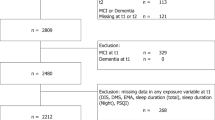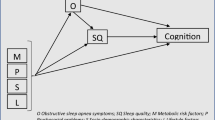Abstract
Background
Currently, a small body of evidence suggests that sleep problems are positively associated with subjective cognitive complaints (SCC). However, no studies on this topic exist from low- and middle-income countries (LMICs). Thus, we investigated the association between sleep problems and SCC in a large sample of middle-age and older adults from 45 LMICs.
Methods
Cross-sectional, predominantly nationally representative, community-based data were analyzed from the World Health Survey. Sleep problems (such as difficulties falling asleep, waking up frequently during the night or waking up too early in the morning) in the last 30 days were self-reported. Two questions on subjective memory and learning complaints in the past 30 days were used to create a SCC scale ranging from 0 (No SCC) to 100 (worse SCC). Multivariable linear regression was conducted to explore the association between sleep problems (exposure) and SCC (outcome).
Results
Data on 60,228 adults aged ≥ 50 years were analyzed [mean (SD) age 61.4 (9.9) years; 53.9% females]. After adjustment for potential confounders, compared to those without sleep problems, the mean SCC score for the multivariable model was 13.32 (95% CI 12.01, 14.63), 19.46 (95% CI 17.95, 20.98), 24.17 (95% CI 22.02, 26.33), and 31.39 (95% CI 28.13, 34.65) points higher for mild, moderate, severe, and extreme sleep problems, respectively. Similar results were found for analyses stratified by age and country-income level.
Conclusion
Sleep problems were positively associated in a dose–response manner with SCC among middle-aged and older adults in multiple LMICs. Addressing sleep problems may aid in the prevention of SCC and ultimately dementia, pending future longitudinal research.


Similar content being viewed by others
References
World Health Organization (2021) Dementia. https://www.who.int/news-room/fact-sheets/detail/dementia. Accessed 8 November 2021.
Aj M (2008) Is it time to separate subjective cognitive complaints from the diagnosis of mild cognitive impairment? Age Ageing 37:497–499
Mendonça Md, Alves L, Bugalho P (2016) From subjective cognitive complaints to dementia: who is at risk?: A systematic review. Am J Alzheimers Dis Other Demen 31:105–114
Aj M, Beaumont H, Ferguson D et al (2014) Risk of dementia and mild cognitive impairment in older people with subjective memory complaints: meta-analysis. Acta Psychiatr Scand 130:439–451
Studart A, Nitrini R (2016) Subjective cognitive decline: the first clinical manifestation of alzheimer’s disease? Dement Neuropsychol 10:170–177
Westerberg CE, Mander BA, Florczak SM et al (2012) Concurrent Impairments In Sleep And Memory In Amnestic Mild Cognitive Impairment. J Int Neuropsychol Soc 18:490–500
Gamaldo AA, Wright RS, Aiken-Morgan AT et al (2019) The association between subjective memory complaints and sleep within older african American adults. J Gerontol B Psychol Sci Soc Sci 74:202–211
Tardy M, Gonthier R, Barthelemy J et al (2015) Subjective sleep and cognitive complaints in 65 year old subjects: a significant association. The proof cohort. J Nutr Health Aging 19:424–430
Van Patten R, Nguyen TT, Mahmood Z et al (2021) Physical and mental health characteristics of 2962 adults with subjective cognitive complaints. Int J Aging Hum Dev. https://doi.org/10.1177/00914150211026548
Mm O, Milesi C (2016) Artificial outdoor nighttime lights associate with altered sleep behavior in the american general population. Sleep 39:1311–1320
Simonelli G, Marshall NS, Grillakis A et al (2018) Sleep health epidemiology in low and middle-income countries: a systematic review and meta-analysis of the prevalence of poor sleep quality and sleep duration. Sleep Health 4:239–250
Nuevo R, Chatterji S, Verdes E et al (2012) The continuum of psychotic symptoms in the general population: a cross-national study. Schizophr Bull 38:475–485
Ghose B, My AR (2017) Memory and learning complaints in relation to depression among elderly people with multimorbidity. Geriatrics 2:15
Koyanagi A, Vancampfort D, Af C et al (2017) Depression comorbid with tuberculosis and its impact on health status: cross-sectional analysis of community-based data from 48 low-and middle-income countries. Bmc Med 15:209
Stubbs B, Koyanagi A, Thompson T et al (2016) The epidemiology of back pain and its relationship with depression, psychosis, anxiety, sleep disturbances, and stress sensitivity: data from 43 low-and middle-income countries. Gen Hos Psychiatry 43:63–70
Nuevo R, Van Os J, Arango C et al (2013) Evidence for the early clinical relevance of hallucinatory-delusional states in the general population. Acta Psychiatr Scand 127:482–493
Moussavi S, Chatterji S, Verdes E et al (2007) Depression, chronic diseases, and decrements in health: results from the world health surveys. The Lancet 370:851–858
Koyanagi A, Stickley A (2015) The association between sleep problems and psychotic symptoms in the general population: a global perspective. Sleep 38:1875–1885
Kessler RC, Üstün TB (2004) The World Mental Health (Wmh) Survey Initiative Version Of The World Health Organization (Who) Composite International Diagnostic Interview (Cidi). Int J Methods Psychiatr Res 13:93–121
Cohen S, Kamarck T, Mermelstein R (1983) A global measure of perceived stress. J Health Soc Behav. https://doi.org/10.2307/2136404
Prince M, Comas-Herrera A, Knapp M, et al. (2016) World Alzheimer Report 2016: Improving Healthcare For People Living With Dementia: Coverage, Quality And Costs Now And In The Future.
Amieva H, Jacqmin-Gadda H, Orgogozo J et al (2005) The 9 year cognitive decline before dementia of the alzheimer type: a prospective population-based study. Brain 128:1093–1101
Higgins JP, Thompson SG (2002) Quantifying heterogeneity. A meta-analysis. Stat Med 21:1539–1558
Stubbs B, Koyanagi A, Veronese N et al (2016) Physical multimorbidity and psychosis: comprehensive cross sectional analysis including 242,952 people across 48 low-and middle-income countries. BMC Med 14:1–12
Koyanagi A, Oh H, Stickley A et al (2016) Risk and functional significance of psychotic experiences among individuals with depression in 44 low-and middle-income countries. Psychol Med 46:2655–2665
Lo JC, Loh KK, Zheng H et al (2014) Sleep duration and age-related changes in brain structure and cognitive performance. Sleep 37:821
Pakkenberg B, Pelvig D, Marner L et al (2003) Aging and the human neocortex. Exp Gerontol 38:95–99
Sexton CE, Storsve AB, Walhovd KB et al (2014) Poor sleep quality is associated with increased cortical atrophy in community-dwelling adults. Neurology 83:967–973
Rasch B, Born J (2013) About sleep’s role in memory. Physiol Rev 93:681–766
Fm Z, Makarem N, Liao M et al (2020) Measures of poor sleep quality are associated with higher energy intake and poor diet quality in a diverse sample of women from the go red for women strategically focused research network. J Am Heart Assoc 9:E014587
Kline CE (2014) The bidirectional relationship between exercise and sleep: implications for exercise adherence and sleep improvement. Am J Lifestyle Med 8:375–379
Nemoto Y, Sato S, Takahashi M et al (2018) The association of single and combined factors of sedentary behavior and physical activity with subjective cognitive complaints among community-dwelling older adults: cross-sectional study. PLoS ONE 13:E0195384
Yuan C, Fondell E, Bhushan A et al (2019) Long-term intake of vegetables and fruits and subjective cognitive function in us men. Neurology 92:E63-75
Stewart SA (2005) The effects of benzodiazepines on cognition. J Clin Psychiatry 66:9–13
Murawski B, Wade L, Plotnikoff RC et al (2018) A systematic review and meta-analysis of cognitive and behavioral interventions to improve sleep health in adults without sleep disorders. Sleep Med Rev 40:160–169
Javaheri S, Redline S (2017) Insomnia and risk of cardiovascular disease. Chest 152:435–444
Hill NL, Mcdermott C, Mogle J et al (2017) Subjective cognitive impairment and quality of life: a systematic review. Int Psychogeriatr 29:1965–1977
Al-Sari UA, Tobias JH, Archer H et al (2017) Do subjective memory complaints predict falls, fractures and healthcare utilization? A two-year prospective study based on a cohort of older women recruited from primary care. Int J Geriatr Psychiatry 32:968–976
Ayalon L (2008) Subjective cognitive functioning as a predictor of all cause mortality in an israeli national sample of community dwelling older adults. Int J Geriatr Psychiatry 23:830–836
Hohman TJ, Beason-Held LL, Lamar M et al (2011) Subjective cognitive complaints and longitudinal changes in memory and brain function. Neuropsychology 25:125
Funding
None.
Author information
Authors and Affiliations
Corresponding author
Ethics declarations
Conflict of interest
None.
Ethical standards
The study was performed in accordance with the ethical standards as laid down in the 1964 Declaration of Helsinki and its later amendments.
Ethical approval
Ethical approval for the survey was provided by ethical boards at each study site.
Statement of human and animal rights
All human and animal studies have been approved by the appropriate ethics committee and have therefore been performed in accordance with the ethical standards laid down in the 1964 Declaration of Helsinki and its later amendments.
Informed consent
All participants gave their informed consent.
Additional information
Publisher's Note
Springer Nature remains neutral with regard to jurisdictional claims in published maps and institutional affiliations.
Supplementary Information
Below is the link to the electronic supplementary material.
Rights and permissions
About this article
Cite this article
Smith, L., Oh, H., Jacob, L. et al. Sleep problems and subjective cognitive complaints among middle-aged and older adults in 45 low- and middle-income countries. Aging Clin Exp Res 34, 1285–1293 (2022). https://doi.org/10.1007/s40520-021-02052-1
Received:
Accepted:
Published:
Issue Date:
DOI: https://doi.org/10.1007/s40520-021-02052-1




